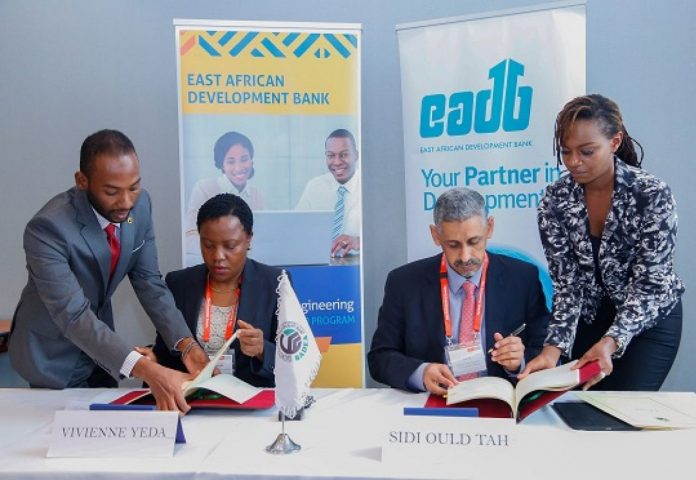The complaint is all too common: In Africa, well performing small and medium-size businesses cannot obtain credit from commercial lenders in order to expand and grow into larger employer enterprises.
It’s a vexing situation about which countless reports have been and continue to be written. According to the African Development Bank, SMEs are crucial to Africa’s growth, contributing more than 45 percent to employment and 33 percent to GDP. The bank cites studies indicating that “more than 70 percent of SMEs lack access to medium-/longer-term finance, creating an SME funding gap of more than US$140 billion in Africa alone.”
I caught up with Vivienne Yeda, director general of the East African Development Bank (EADB), at the Africa-America Institute’s 30th Annual Awards Gala in September in New York City, where she received the institute’s 2014 Business Leader Award (pictured above). The Kampala, Uganda,-based bank provides financial and related assistance to enterprises in the member states of the East African Community – Kenya, Uganda, Tanzania and Rwanda – with a view toward the region’s long-term economic and industrial development. Yeda has been the its director general since 2010 and has overseen its portfolio growth and transformation into one of the biggest regional lenders today. I asked her specifically about the bank’s support for entrepreneurs and SMEs.
AfSB. Does the East African Development Bank have facilities that cater to small businesses?
Yeda. Our mandate actually is to finance entrepreneurs. A large part of our portfolio is actually startup entrepreneurs. That means clients who have not had a long track record in whatever sector they are trying to promote. We work with them, primarily to see where they can develop the business where it can be sustainable and in the long run to expand it.
Eighty percent of our portfolio is small businesses.
AfSB. What is the repayment record like for these businesses?
Yeda. The repayment track record is good. We don’t have a large portfolio of non-performing loans. I can tell you at the moment it’s about 1 percent of our portfolio, which is very, very small. And those are generally not small businesses. It’s large clients who have had some difficulties. Yes, they [small businesses] do have problems. Like any other business, your business cycle is up and down. But they are able to manage those cycles and we work with them. So I wouldn’t say that we’ve had significant challenges with the credit record of small businesses.
AfSB. And you’re seeing increased demand from this sector?
Yeda. Yes. The demand is great. Many commercial banks are not ready to finance entrepreneurs, particularly startup businesses that don’t have a track record in their sector, that cannot show or demonstrate expertise in the particular sector. So that leaves us with quite a wide pool of businesses to work with.
AfSB. Does the bank work with SMEs across all industry sectors?
Yeda. We go across all industry sectors, particularly the productive sectors. So we are keen to work in agriculture. That is important. It’s a large employer. It also provides food security and it also provides sustainability in the long term. We work in education, we work in transport, in health, in manufacturing – light-scale industries, food processing and the like. So it’s quite a wide mandate.
Established in 1967, the EADB offers the following in addition to loans:
* Lines of credit to national and regional development finance institutions, micro finance institutions and local banks to enhance its support to SMES and new projects;
* Asset lease financing – particularly to businesses in construction, transport and agriculture – to acquire equipment;
* Equity and venture funds to enterprises that require such support rather than debt; and
* Consulting services to businesses that require specialized advice on capital formation, cash flow and wealth management, as well as project implementation and management.













